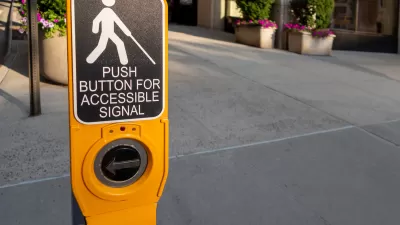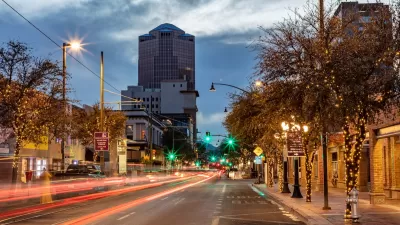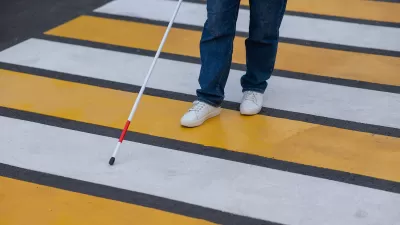Some critics of car-free zones call them exclusionary to people with disabilities, but other experts argue that, when properly planned, pedestrian enhancements improve safety and accessibility for everyone.
In a piece for Mother Jones, Julia Métraux explains how accessibility is being used as a “political football” to push back against car-free zones and other pedestrian infrastructure that some say harms mobility for disabled people. “Opponents of such initiatives have called them ‘exclusionary,’ ‘not progressive or inclusive,’ and bound to ‘hurt people with disabilities,’ pointing out that many disabled people simply need cars to get around.”
Yet disabled people are more likely not to drive, and car-heavy cities are more dangerous to disabled people, says expert Anna Zivarts. “A 2015 study by Georgetown University researchers found that the rate of vehicle-pedestrian deaths among wheelchair users was 36% higher than that of the overall population.”
Even when accessibility is an issue, it’s often easily solved. “In 2022, when San Francisco’s Golden Gate Park permanently closed a major boulevard to cars, opponents, including city Supervisor Connie Chan, said it was disabled and aging folks who would pay the price. But free shuttles, accessible to anyone, now bridge the gap.”
San Francisco also maintains a dialogue with disabled residents to ensure its programs serve them. When the city was evaluating its scooter sharing program, feedback from a group of students with disabilities helped the city opt for scooters with backrests and larger wheels for stability to ensure more people can ride them.
FULL STORY: Do Car-Free Zones Hurt Disabled People? Experts Explain.

Alabama: Trump Terminates Settlements for Black Communities Harmed By Raw Sewage
Trump deemed the landmark civil rights agreement “illegal DEI and environmental justice policy.”

Study: Maui’s Plan to Convert Vacation Rentals to Long-Term Housing Could Cause Nearly $1 Billion Economic Loss
The plan would reduce visitor accommodation by 25% resulting in 1,900 jobs lost.

Planetizen Federal Action Tracker
A weekly monitor of how Trump’s orders and actions are impacting planners and planning in America.

Wind Energy on the Rise Despite Federal Policy Reversal
The Trump administration is revoking federal support for renewable energy, but demand for new projects continues unabated.

Passengers Flock to Caltrain After Electrification
The new electric trains are running faster and more reliably, leading to strong ridership growth on the Bay Area rail system.

Texas Churches Rally Behind ‘Yes in God’s Back Yard’ Legislation
Religious leaders want the state to reduce zoning regulations to streamline leasing church-owned land to housing developers.
Urban Design for Planners 1: Software Tools
This six-course series explores essential urban design concepts using open source software and equips planners with the tools they need to participate fully in the urban design process.
Planning for Universal Design
Learn the tools for implementing Universal Design in planning regulations.
Caltrans
Smith Gee Studio
Institute for Housing and Urban Development Studies (IHS)
City of Grandview
Harvard GSD Executive Education
Toledo-Lucas County Plan Commissions
Salt Lake City
NYU Wagner Graduate School of Public Service





























